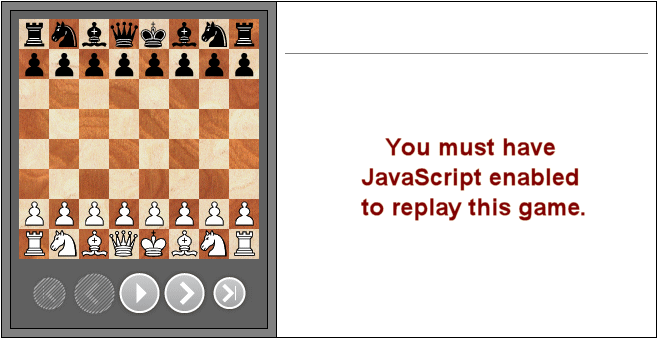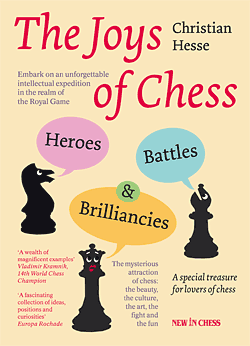


ChessBase 17 - Mega package - Edition 2024
It is the program of choice for anyone who loves the game and wants to know more about it. Start your personal success story with ChessBase and enjoy the game even more.
Every chess player probably has his favourite game. It is often Byrne-Fischer from the Rosenwald Tournament 1956 in New York, Kasparov-Topalov, played in 1999 in Wijk aan Zee, or for chess romantics the Immortal Game Anderssen-Kieseritzky from 1851. All of these are games which caused some furore.
My own favourite game is far less prominent, yes one could even say a little bit forgotten, a tiny enclave of the marvellous hidden in obscurity. The whole game is dominated by a series of sacrifices which run right through it in a continuous stream. The now US-citizen and grandmaster Greg (Grigory) Serper sacrifices a whole primeval forest of wood against the Greek grandmaster Ioannis Nikolaidis, he promotes two pawns, loses one of the resulting queens again and leads his surviving group of pieces to victory. All that in 48 moves. A post-modern immortal game with a romantic touch.
I first saw this game in Chess Informant, Volume 60, 1994, where a friend pointed it out to me. Since then, I have come back to it many times over the years and analysed it with the help of various software. It continues to be heart-warming.

[Event "St Petersburg"] [Site "?"] [Date "1993.??.??"] [Round "?"] [White "Serper, Grigory"] [Black "Nikolaidis, Ioannis"] [Result "1-0"] [ECO "E70"] [WhiteElo "2575"] [BlackElo "2440"] [PlyCount "95"] [EventDate "1993.??.??"] 1. c4 g6 2. e4 Bg7 3. d4 d6 4. Nc3 Nf6 5. Nge2 Nbd7 6. Ng3 c6 7. Be2 a6 8. Be3 h5 9. f3 b5 10. c5 dxc5 11. dxc5 Qc7 12. O-O h4 13. Nh1 Nh5 14. Qd2 e5 15. Nf2 Nf8 16. a4 b4 {Glorying in the danger, Serper now risks an attack of a fundamental character.} 17. Nd5 $3 ({More surprising, stronger and more beautiful than} 17. Ncd1 Nf4 18. Nd3 N8e6 19. Nxb4 h3 20. g3 Nxe2+ 21. Qxe2 a5 22. Nd3 Ba6 {with equality in view of the pressure which Black will now be able to exert.}) 17... cxd5 18. exd5 f5 19. d6 Qc6 {Thus endeth the first skirmish. The second follows right on its heels.} 20. Bb5 $3 ({Once again, more striking than the worthy alternative} 20. Nd3 f4 21. Bf2 Qd5 22. Rfd1 Ng3 {which also results in a slight advantage for White.}) {Serper certainly had an eye on this follow-up sacrifice when he offered the first one. Black already has grounds to worry.} 20... axb5 21. axb5 Qxb5 ({Even} 21... Qb7 22. c6 Rxa1 23. cxb7 Rxf1+ 24. Kxf1 Bxb7 25. Nd3 {is favourable for White.}) 22. Rxa8 Qc6 23. Rfa1 $1 {Implicitly the white bishop on e3 is being offered up as a sacrifice, since it will be lost after an advance of the black f-pawn. And indeed:} f4 24. R1a7 {Fritz evaluates the position as advantageous to White, Shredder does not dissent.} Nd7 {The situation has become quite ticklish, a whole tangle of lines which are crackling with electricity must be taken into account. In view of the majestic position of the white rooks, a further blow is in the offing.} 25. Rxc8+ {This time an exchange sacrifice - clearly the best option here.} (25. Ng4 {would also be advantageous to White, but gives Black the possibility of getting his king to safety by castling away from the action:} O-O 26. Bf2 e4 27. Qxb4 e3 28. Bxh4) 25... Qxc8 {What is the most favourable way for White to strengthen his attack?} 26. Qd5 $1 {Serper once more hits upon the strongest, even compared with} (26. Nh3 fxe3 27. Qd5 e2 28. Qe6+ Kf8 {which is good enough for a draw.}) 26... fxe3 {For Black, the best plan is to accept the sacrifice in order to fish in troubled waters.} 27. Qe6+ ({The alternative} 27. Nd3 e2 28. c6 Kf8 29. Rxd7 Qe8 30. Re7 {also wins.}) 27... Kf8 28. Rxd7 {with a Fritz or Shredder evaluation of +2.10 or +2.65, wins} ({as does} 28. Ne4 e2 29. Kf2 Nhf6 30. Ke1 $1 {So it is a question of taste!}) 28... exf2+ 29. Kf1 $1 ({Not} 29. Kxf2 {on account of} Qxc5+ {and Black wins.}) 29... Qe8 30. Rf7+ Qxf7 31. Qc8+ Qe8 32. d7 Kf7 33. dxe8=Q+ {The first white pawn reaches promotion alley.} Rxe8 34. Qb7+ Re7 {The c-pawn has dazzling possibilities for development, which are more momentous than the more up-front saving of the queen. So Serper gives it the green light.} 35. c6 $1 e4 36. c7 e3 37. Qd5+ ({With anything else, White will cause problems for himself, e.g.} 37. Qxb4 e2+ 38. Kxf2 e1=Q+ 39. Qxe1 Rxc7 40. b4 Bd4+ 41. Kf1 Nf4 {and Black's forces come to life.}) 37... Kf6 38. Qd6+ Kf7 39. Qd5+ {Obviously Serper had not yet sounded out the winning continuation; or perhaps he was in time trouble and wanted to play a quick and safe move.} ({Of course} 39. Qxe7+ Kxe7 40. c8=Q Bxb2 41. Qc5+ {would have won here already.}) 39... Kf6 40. Qd6+ Kf7 {The black e-pawn is life-threatening for White because of the support from its rook, but without that it would be nothing. Therefore} 41. Qxe7+ ({ Here there was the chance to make a beastly mistake: after} 41. c8=Q {the white king would be run down by a pedestrian.} e2+ 42. Kxf2 e1=Q# {The calamity of the missing bolthole. On the other hand, the text move liquidates to a winning ending.}) 41... Kxe7 42. c8=Q {There is nothing wrong with the second pawn promotion.} Bh6 43. Qc5+ Ke8 44. Qb5+ Kd8 45. Qb6+ Kd7 46. Qxg6 e2+ $1 {A last finesse in a situation with a fast approaching sell-by date.} 47. Kxf2 ({The unthinking} 47. Kxe2 {would now not only lose the queen but the whole game to} Nf4+) 47... Be3+ {Black fights like a lion.} 48. Ke1 {And it's all over now.} ({The hasty and careless slip} 48. Kxe3 $4 e1=Q+ {had to be avoided!}) 1-0
Not just a piece of high art, but a masterpiece for the treasury of chess. Black is brought down by a series of sacrifices of epic proportions, which raises the game far above the normal. It awakes in me memories of the potlatch ceremonies of the Kwakiutl Indians of British Columbia, when – in order to establish who is the most powerful without resorting to violence – a chief will demolish all his material possessions in an incomparable orgy of sacrifice and challenge a rival chief to sacrifice riches which are at least as great, otherwise ‘his name will be broken’. Serper put all his pieces on the line to achieve victory, seven beautiful and effective piece sacrifices. In return, Nikolaidis counter-balanced this with the sacrifice of pawn, bishop, rook and queen.
Note: The Joys of Chess contain an extensive seven-page list of bibliography with references to works that were used in researching its 94 essays. This list is not included here with the above sample chapter.
 The Joys of Chess is an unforgettable intellectual expedition to the remotest corners of the Royal Game. En route, intriguing thought experiments, strange insights and hilarious jokes will offer vistas you have never seen before.
The Joys of Chess is an unforgettable intellectual expedition to the remotest corners of the Royal Game. En route, intriguing thought experiments, strange insights and hilarious jokes will offer vistas you have never seen before.
The beauty, the struggle, the culture, the fun, the art and the heroism of chess – you will find them all in this sparkling book that will give you many hours of intense joy.
Christian Hesse is a Harvard-trained professor of Mathematics who has taught at the University of California, Berkeley (USA), and since 1991 at the University of Stuttgart. He has written a textbook called 'Angewandte Wahrscheinlichkeitstheorie'.
Chess and literature are his main hobbies, and he also likes fitness and boxing. His heroes are the ones who fall to the bottom and rise again, fall and rise again…
From the foreword by by Ex-World Champion Vishy Anand: "A rich compendium of spectacular highlights and defining moments from chess history: fantastic moves, beautiful combinations, historical blunders, captivating stories, and all this embedded into a plentitude of quick-witted ideas and contemplations as food for thought."